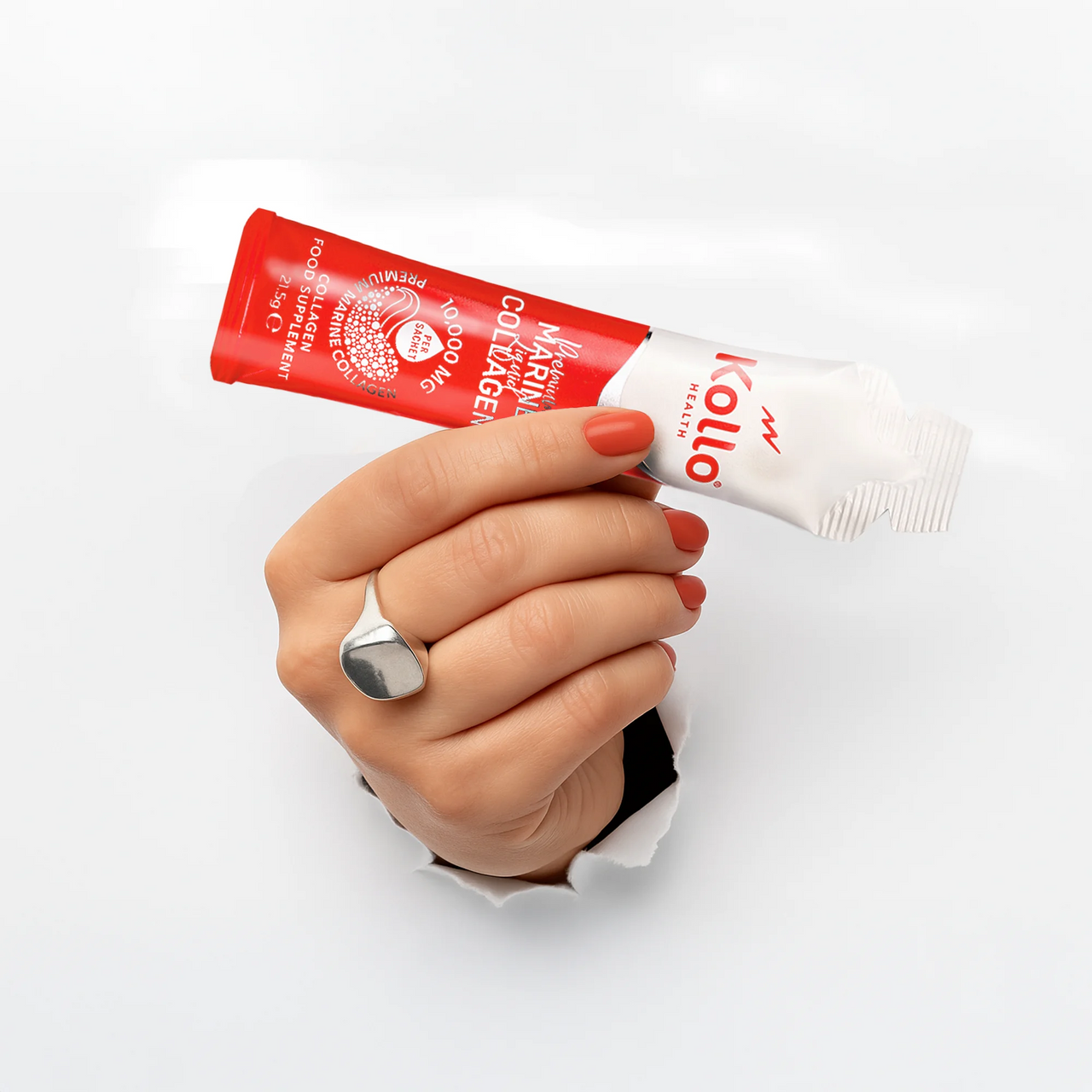Collagen supplements have gained popularity for their role in improving skin elasticity, joint health, and overall wellness. However, with their rise in use, there’s a growing concern: Could taking collagen increase the risk of breast cancer? These concerns stem from collagen’s integral role in the extracellular matrix (ECM), which plays a part in tissue structure and cell behavior, including cancerous cells. While collagen itself is essential for healthy tissue, some studies have explored its potential influence on tumor development, specifically in breast cancer. This blog will investigate whether collagen supplements pose any real risk, particularly for breast cancer patients or survivors.
What Is Collagen Used For?
Collagen is the body’s most abundant protein, providing structural support to skin, bones, muscles, tendons, and connective tissue. As we age, collagen production naturally declines, leading to wrinkles, joint stiffness, and weakened bones. Collagen supplements are often used to counteract these effects, improving skin appearance, joint flexibility, and even gut health.
Here’s a breakdown of the most common uses of collagen supplements:
- Improving skin elasticity: Collagen helps maintain skin structure, reducing wrinkles and promoting a more youthful appearance. It boosts hydration and firmness, addressing signs of aging. People take collagen supplements to maintain healthy, glowing skin as they age.
- Joint and bone support: Collagen aids in the regeneration of cartilage and helps strengthen bones. Regular collagen supplementation has been shown to reduce joint pain, particularly in people suffering from osteoarthritis. Over time, collagen can improve overall mobility and reduce inflammation in the joints.
- Muscle recovery and strength: Collagen peptides contribute to muscle repair and recovery after intense exercise. This is particularly beneficial for athletes or individuals looking to enhance muscle mass and strength. It also helps reduce muscle soreness after strenuous activities.
- Gut health support: Collagen helps repair the gut lining, which can be beneficial for individuals with conditions like leaky gut syndrome. It promotes the growth of tissues that line the gastrointestinal tract, improving digestion and overall gut health.
Know About Collagen and Breast Cancer
There’s growing interest in understanding how collagen interacts with breast cancer cells. Since collagen is a key component of the ECM, which influences how cells grow, divide, and move, it naturally becomes a focus in cancer research. The concern arises from studies showing that the ECM’s structure can affect the behavior of cancer cells.
For example, a denser ECM may facilitate the spread of cancer cells, providing a “highway” for them to migrate to other parts of the body. This is particularly true in some forms of breast cancer, where dense breast tissue has been linked to a higher risk of developing cancer. Collagen, as a major part of the ECM, can potentially influence this process. However, it’s essential to note that this refers to the body’s natural collagen—not collagen supplements.
As of now, there is no direct evidence connecting collagen supplements with an increased risk of breast cancer. The concerns about collagen and breast cancer are primarily focused on how the ECM behaves within the body, particularly in those with dense breast tissue.
Studies on Collagen and Breast Cancer

Several studies have been conducted to better understand the role of collagen in cancer development, specifically breast cancer. Some research has shown that increased collagen levels in the ECM can contribute to tumor growth and metastasis. For example, higher concentrations of Type I and Type IV collagen have been associated with more aggressive breast cancers.
Here’s a summary of what current studies say:
- Type I collagen: Found in the skin and connective tissues, Type I collagen is the most common form. In breast cancer, high levels of Type I collagen in the ECM may promote tumor growth by creating a structure that allows cancer cells to spread more easily.
- Type IV collagen: This type of collagen is present in the basement membrane, which supports cell layers. Some studies suggest that high levels of Type IV collagen may influence the spread of cancer cells by making it easier for them to invade surrounding tissues.
- Collagen crosslinking: Research also indicates that the process of collagen crosslinking (where collagen fibers bind together) can contribute to tumor stiffness, which is a hallmark of some aggressive cancers. A stiffer tumor environment can make it easier for cancer cells to proliferate and spread.
Despite these findings, it’s crucial to emphasize that these studies primarily focus on natural collagen in the ECM, not the collagen taken from supplements. There’s no solid evidence that consuming collagen supplements leads to cancer development or increases the risk of metastasis.
Is Collagen Safe for Cancer Patients?

For cancer patients or survivors, the decision to take any supplement should be made cautiously. Collagen supplements, in particular, should be discussed with a healthcare provider before adding them to your daily regimen. While collagen can help support skin health, joint function, and overall recovery during cancer treatment, it’s important to understand the potential interactions with other medications or therapies.
Here are some key considerations:
- Consult with a doctor: It’s essential for cancer patients to consult their oncologist or healthcare provider before starting any supplement. Even though collagen is generally considered safe, there may be individual factors that affect whether it’s advisable during cancer treatment.
- Monitor for interactions: Collagen supplements may interact with certain cancer treatments. Although no known significant interactions exist, it’s always better to err on the side of caution. Regular monitoring by a doctor can help ensure supplements don’t interfere with therapy.
In most cases, collagen supplements are safe for cancer patients, but personalised medical advice is always recommended.
Types of Collagen
Different types of collagen serve various purposes in the body. While there are over 20 types, the most common types found in supplements include Type I, II, III, IV, and V.
Type I:
- Type I collagen is the most abundant type in the human body, primarily found in the skin, bones, tendons, and ligaments.
- It’s often included in supplements for its anti-aging benefits, helping to reduce wrinkles and support bone health, making it a popular choice for skincare and joint formulas.
Type II:
- Type II collagen is the main component of cartilage, providing structure and elasticity to the joints.
- Supplements containing Type II collagen are often used to treat joint issues such as osteoarthritis, as it helps maintain joint flexibility and reduce inflammation.
Type III:
- Type III collagen is found in the skin, lungs, and blood vessel walls, and works alongside Type I to maintain the structural integrity of tissues.
- It plays a significant role in wound healing and maintaining the elasticity of organs like the heart and blood vessels, making it essential for cardiovascular health.
Type IV:
- Type IV collagen is located in the basement membrane, which supports cells and separates them from surrounding tissues.
- It’s crucial for maintaining tissue integrity and plays a role in tissue regeneration, which is why it’s studied in relation to cancer cells’ ability to invade surrounding tissues.
Type V:
- Type V collagen is found in hair, the placenta, and on the surfaces of cells.
- It helps regulate the structure of collagen fibers, contributing to the strength and health of skin, hair, and other tissues.
How Frequently Should You Take Collagen?
For general health benefits, most people take collagen supplements daily. The typical dosage ranges from 2.5 to 15 grams per day, depending on the desired effect. For skin and joint health, studies suggest a daily intake of around 5 grams is sufficient to see noticeable improvements over time.
Cancer patients or individuals concerned about cancer risk should consult their healthcare providers for personalised dosage recommendations. While collagen supplements are generally safe, it’s essential to ensure they won’t interfere with ongoing cancer treatments or recovery processes.
Specific Collagen Families in Breast Cancer
Some research highlights specific collagen families that play a role in breast cancer development. Type I and Type IV collagen, in particular, have been shown to contribute to the tumor microenvironment, potentially influencing how cancer cells grow and spread.
- Type I collagen: As the most abundant collagen in the ECM, Type I collagen can form a scaffold that may support cancer cell movement and growth. Research has shown that tumors with higher levels of Type I collagen may have a greater capacity for metastasis.
- Type IV collagen: Found in the basement membrane, Type IV collagen helps regulate how cells interact with their surroundings. It can influence cancer cells' ability to invade nearby tissues and spread to other areas of the body.
Though this research is ongoing, it primarily relates to the body’s natural collagen, not supplements. More studies are needed to establish whether supplementing with collagen has any effect on breast cancer development or progression.
Conclusion
While collagen is an essential protein for maintaining skin, joint, and bone health, there is no solid evidence linking collagen supplements to an increased risk of breast cancer. Most concerns about collagen’s role in breast cancer revolve around how the body’s natural collagen influences the ECM and tumor growth. If you’re considering collagen supplements, especially as a cancer patient or survivor, it’s essential to consult your healthcare provider. Collagen supplements can offer significant health benefits but should be taken with care, especially if you have a history of cancer.







